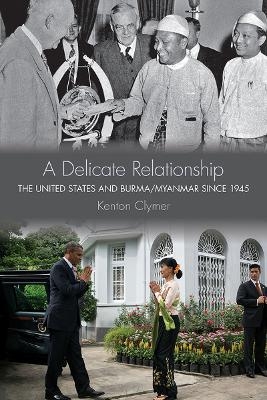
A Delicate Relationship
Cornell University Press (Verlag)
978-0-8014-5448-6 (ISBN)
When Burma, a British colony since the nineteenth century, achieved independence in 1948, the United States feared that the country might be the first Southeast Asian nation to fall to the communists, and it embarked on a series of efforts to prevent this. In 1962, General Ne Win, who toppled the government in a coup d’état, established an authoritarian socialist military junta that severely limited diplomatic contact and led to a period in which the primary American diplomatic concern became Burma’s increasing opium production. Ne Win’s rule ended (at least officially) in 1988, when the Burmese people revolted against the oppressive military government. Aung San Suu Kyi emerged as the charismatic leader of the opposition and was awarded the Nobel Peace Prize in 1991. Amid these great changes in policy and outlook, Burma/Myanmar remained fiercely nonaligned and, under Ne Win, isolationist. The limited diplomatic exchange that resulted meant that the state was often a frustrating puzzle to U.S. officials.
Clymer explores attitudes toward Burma (later Myanmar), from anxious anticommunism during the Cold War to interventions to stop drug trafficking to debates in Congress, the White House, and the Department of State over how to respond to the emergence of the opposition movement in the late 1980s. The junta’s brutality, its refusal to relinquish power, and its imprisonment of opposition leaders resulted in public and Congressional pressure to try to change the regime. Indeed, Aung San Suu Kyi’s rise to prominence fueled the new foreign policy debate that was focused on human rights, and in that climate Burma/Myanmar held particularly large symbolic importance for U.S. policy makers. Congressional and public opinion favored sanctions, while U.S. presidents and their administrations were more cautious. Clymer’s account concludes with President Obama’s visits in 2012 and 2014, and visits to the United States by Aung San Suu Kyi and President Thein Sein, which marked the establishment of a new, warmer relationship with a relatively open Myanmar.
Kenton Clymer is Distinguished Research Professor of History at Northern Illinois University. He is the author of several books, including Troubled Relations: The United States and Cambodia since 1870, Protestant Missionaries in the Philippines, 1898–1916: An Inquiry into the American Colonial Mentality, and Quest for Freedom: The United States and India’s Independence. * Journal of Southeast Asian Studies *
Introduction
1. Burmese Nationalism and the Path to Independence
2. The Leaky Derelict
3. High Treason: The Trial of the "Burma Surgeon"
4. The Kuomintang Embarrassment
5. China, Communists, and Other Insurgents
6. Changing Course on the Kuomintang
7. The Neutrality Conundrum
8. The China Border, a “Polite Coup,” and Return to Democratic Government
9. The U Nu Interregnum: To the Hard Coup of 1962
10. Ne Win's Way to Socialism
11. The Relationship Stabilizes
12. The Narcotics Era
13. Revolt
14. The Thaw
Appendix: US Ambassadors and Chargés d’Affaires Appointed to Burma
| Zusatzinfo | 16 Halftones, black and white |
|---|---|
| Verlagsort | Ithaca |
| Sprache | englisch |
| Maße | 155 x 235 mm |
| Gewicht | 907 g |
| Themenwelt | Geschichte ► Allgemeine Geschichte ► Zeitgeschichte |
| Geisteswissenschaften ► Geschichte ► Regional- / Ländergeschichte | |
| Sozialwissenschaften ► Politik / Verwaltung ► Europäische / Internationale Politik | |
| Sozialwissenschaften ► Politik / Verwaltung ► Staat / Verwaltung | |
| ISBN-10 | 0-8014-5448-4 / 0801454484 |
| ISBN-13 | 978-0-8014-5448-6 / 9780801454486 |
| Zustand | Neuware |
| Haben Sie eine Frage zum Produkt? |
aus dem Bereich


